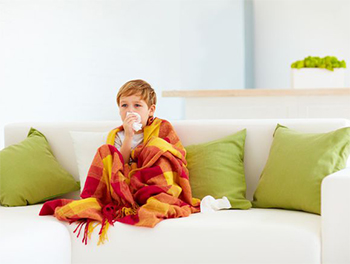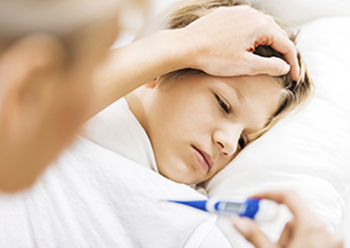
Antibiotics are medicines used to treat infections and they target bacteria, not viruses. Before prescribing an antibiotic, your child’s doctor will find out if it is the right medicine to treat your child’s infection.
- My child has a really bad cold. Why won’t the doctor prescribe an antibiotic?
Colds are caused by viruses. Antibiotics are used specifically for infections caused by bacteria. In general, most common cold symptoms—such as runny nose, cough, and congestion—are mild and your child will get better without using any medicines.
- Don’t some colds turn into bacterial infections? So why wait to start an antibiotic?
In most cases, bacterial infections do not follow viral infections. Using antibiotics to treat viral infections may instead lead to an infection caused by resistant bacteria. Also, your child may develop diarrhea or other side effects. If your child develops watery diarrhea, diarrhea with blood in it, or other side effects while taking an antibiotic, call your child’s doctor.
- Isn’t a nose draining yellow or green mucus a sign of a bacterial infection?
During a common cold, it is normal for mucus from the nose to get thick and to change from clear to yellow or green. Symptoms often last for 10 days.
Sinusitis is a term that means inflammation of the lining of the nose and sinuses. A virus or allergy can cause sinusitis and in some cases, bacteria can be the cause.
There are certain signs that bacteria may be involved in your child’s respiratory illness. If your child has a common cold with cough and green mucus that lasts longer than 10 days, or if your child has thick yellow or green mucus and a fever higher than 102°F (39°C) for at least 3 or 4 days, this may be a sign of bacterial sinusitis.
- Aren’t antibiotics needed to treat ear infections?
Not all ear infections are treated with antibiotics. At least half of all ear infections go away without antibiotics. If your child does not have a high fever or severe ear pain, your child’s doctor may recommend observation initially. Pain is often the first and most uncomfortable symptom of ear infection, your child’s doctor will suggest pain medicine to ease your child’s pain. Acetaminophen and ibuprofen are over-the-counter pain medicines that may help lessen much of the pain. Be sure to use the right dose for your child’s age and size. In most cases, pain and fever will improve within the first 1 to 2 days.
There are also ear drops that may help ear pain for a short time. You can ask your child’s doctor if your child should use these drops. Over-the-counter cold medicines (decongestants and antihistamines) don’t help clear up ear infections and are not recommended for young children. Your child’s doctor may prescribe antibiotics if your child has fever that is increasing, more severe ear pain, and infection in both eardrums.
- Aren’t antibiotics used to treat all sore throats?
No. More than 80% of sore throats are caused by a virus. If your child has sore throat, runny nose, and a barky cough, a virus is the likely cause and a test for “strep” is not needed and should not be performed. Antibiotics should only be used to treat sore throats caused by group A streptococci. Infection caused by this type of bacteria is called “strep throat.” Strep throat generally affects school-aged children and not children younger than 3 years. If your child’s doctor suspects strep throat based on your child’s symptoms, a strep test should always be performed. If the test is positive, antibiotics will be prescribed.
- Do antibiotics cause any side effects?
Side effects can occur in 1 out of every 10 children who take an antibiotic. Side effects may include rashes, allergic reactions, nausea, diarrhea, and stomach pain. Make sure you let your child’s doctor know if your child has had a reaction to antibiotics. Sometimes a rash will occur during the time a child is taking an antibiotic. However, not all rashes are considered allergic reactions. Tell your child’s doctor if you see a rash that looks like hives (red welts); this may be an allergic reaction. If your child has an allergic reaction that causes an itchy rash, or hives, this will be noted in her medical record.
- How long does it take an antibiotic to work?
Most bacterial infections improve within 48 to 72 hours of starting an antibiotic. If your child’s symptoms get worse or do not improve within 72 hours, call your child’s doctor. If your child stops taking the antibiotic too soon, the infection may not be treated completely and the symptoms may start again.
- Can antibiotics lead to resistant bacteria?
The repeated use and misuse of antibiotics can lead to resistant bacteria. Resistant bacteria are bacteria that are no longer killed by the antibiotics commonly used to treat bacterial infection. These resistant bacteria can also be spread to other children and adults.
It is important that your child use the antibiotic that is most specific for your child’s infection rather than an antibiotic that would treat a broader range of infections. If your child does develop an antibiotic-resistant infection, a special type of antibiotic may be needed. Sometimes, these medicines need to be given by IV (vein) in the hospital.
- How can I use antibiotics safely?
- Antibiotics aren’t always the answer when your child is sick. Ask your child’s doctor what the best treatment is for your child.
- Ask your child’s doctor if the antibiotic being prescribed is the best for your child’s type of bacterial infection. For instance, certain antibiotics such as azithromycin are no longer effective for the bacteria causing most ear and sinus infections.
- Antibiotics work against bacterial infections. They don’t work on colds and flu.
- Make sure that you give the medicine exactly as directed.
- Don’t use one child’s antibiotic for a sibling or friend; you may give the wrong medicine and cause harm.
- Throw away unused antibiotics. Do not save antibiotics for later use; some out-of-date medicines can actually be harmful. Call Poison Help at 1-800-222-1222 or check the US Food and Drug Administration Web site for information on the safe disposal of medicines.
The information provided is for general interest only and should not be misconstrued as a diagnosis, prognosis or treatment recommendation. This information does not in any way constitute the practice of medicine, or any other health care profession. Readers are directed to consult their health care provider regarding their specific health situation. Marque Medical is not liable for any action taken by a reader based upon this information.


